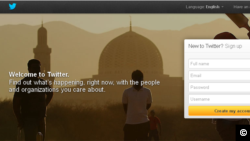WASHINGTON — A new study by the U.S. public relations firm Burson-Marsteller shows that Twitter, a social medium that limits users to comments of 140 characters, is a growing outlet for diplomacy. This trend has been dubbed "Twiplomacy." The firm says that while Twitter is a powerful tool for diplomats, it will not replace traditional diplomacy.
The new Burson-Marsteller study found that two-thirds of the world's leaders have joined Twitter. Some have gained huge followings. U.S. President Barack Obama, for example, has more than 17 million followers, and Venezuelan President Hugo Chavez has more than 3 million.
But the fact that leaders are tweeting does not mean other global leaders are listening. The study found that even the popular @BarackObama account has just more than a fourth of all world leaders and governments following it. In fact, not even the White House account follows the president, and Mr. Obama only mutually follows two world leaders on Twitter.
These limitations caused the Burson-Marsteller group to conclude that Twitter diplomacy, or "Twiplomacy," is incapable of replacing traditional diplomacy.
The Heritage Foundation's James Carafano could not agree more. "Twitter is never going to be a substitute for diplomacy. That’s just nuts," he said.
"If somebody thinks that 140 characters is the diplomatic solution to solving the world’s problems then we’ve got a big problem. Twitter really wasn't created for diplomacy. Twitter’s not even created to have a conversation," he said.
Carafano wrote a book, published this year, called Wiki at War: Conflict in a Socially Networked World. In it, he explains how some social media users engage in what he calls "broadcast mode" to communicate. In the case of Twitter, most global leaders can send out many messages but do not frequently converse with other Twitter users. He says this practice lacks the capacity for true diplomacy, and can only be used to help foster diplomacy through other outlets.
"If you wanted to use Twitter as an engagement tool, what you'd have to figure out is, doing it in broadcast mode and identifying people, and then trying to find out how to drag them to a different place, either Facebook, or a telephone conversation or Skype or something else, where you can have more of a two-way communication," Carafano said.
The study shows that as diplomacy continues to adapt to new technology, world leaders will need to find more effective ways to communicate on social media. Even as the tweets keep coming by the tens of thousands, traditional diplomacy is in no danger of disappearing.
The new Burson-Marsteller study found that two-thirds of the world's leaders have joined Twitter. Some have gained huge followings. U.S. President Barack Obama, for example, has more than 17 million followers, and Venezuelan President Hugo Chavez has more than 3 million.
But the fact that leaders are tweeting does not mean other global leaders are listening. The study found that even the popular @BarackObama account has just more than a fourth of all world leaders and governments following it. In fact, not even the White House account follows the president, and Mr. Obama only mutually follows two world leaders on Twitter.
These limitations caused the Burson-Marsteller group to conclude that Twitter diplomacy, or "Twiplomacy," is incapable of replacing traditional diplomacy.
The Heritage Foundation's James Carafano could not agree more. "Twitter is never going to be a substitute for diplomacy. That’s just nuts," he said.
"If somebody thinks that 140 characters is the diplomatic solution to solving the world’s problems then we’ve got a big problem. Twitter really wasn't created for diplomacy. Twitter’s not even created to have a conversation," he said.
Carafano wrote a book, published this year, called Wiki at War: Conflict in a Socially Networked World. In it, he explains how some social media users engage in what he calls "broadcast mode" to communicate. In the case of Twitter, most global leaders can send out many messages but do not frequently converse with other Twitter users. He says this practice lacks the capacity for true diplomacy, and can only be used to help foster diplomacy through other outlets.
"If you wanted to use Twitter as an engagement tool, what you'd have to figure out is, doing it in broadcast mode and identifying people, and then trying to find out how to drag them to a different place, either Facebook, or a telephone conversation or Skype or something else, where you can have more of a two-way communication," Carafano said.
The study shows that as diplomacy continues to adapt to new technology, world leaders will need to find more effective ways to communicate on social media. Even as the tweets keep coming by the tens of thousands, traditional diplomacy is in no danger of disappearing.









